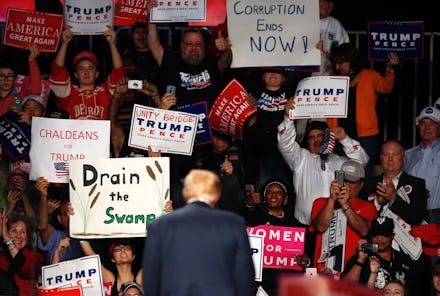Mara Wilson's tweetstorm nails why being Jewish in the Trump era is so terrifying

On Tuesday, actress and author Mara Wilson explained in a string of tweets why this year, for the first time ever, she fears being openly Jewish. And she's not the only one who feels that way.
Wilson tweeted out an illustration of Hillary Clinton onto which someone had doodled a six-pointed star, or a Jewish star. "Saw this on the subway platform last night," Wilson wrote. "I know it's just hastily drawn graffiti on a drawing, but it bothered me... "
She continued, explaining, in more, tweets, that before this past year, she can only remember one instance in which she, says, she felt "scared to be a Jew," citing a frightening incident in which she was confronted with anti-Semitism on the subway. But this year, she explained, things feel different thanks to the presidential campaign of Donald Trump, to whom she notably refers as "Tr*mp."
Wilson's experience of anti-Semitism is personal — but she's not the only person to feel as though that specific brand of hate speech has become bolder and more virulent during during Trump's campaign, at least on social media.
In July, Observer reporter Dana Schwartz wrote an open letter to Trump's Jewish son-in-law, Jared Kushner, who owns the publishing company that owns the Observer. Schwartz challenged Kushner to condemn the deluge of anti-Semitic and violent threats she had received on Twitter after criticizing Donald Trump's reposting of an anti-Semitic meme.
The harassment isn't limited to generic slurs and stereotypes. Earlier this month, Politico reporter received a death threat from a Trump supporter along with a photo of herself with a gunshot wound to her forehead and a yellow Star of David on her shirt.
According to a report released this month by the Anti-Defamation League, almost 20,000 "overtly anti-Semitic" tweets were sent to journalists since the start of the Presidential campaign. Many, but not all, of the targeted journalists were actually Jewish, and most had written pieces critical of Donald Trump.
While the ADL clarified in its report that "there is no known causal relationship between Mr. Trump or his campaign and the wave of anti-Semitic attacks against journalists," Trump has arguably fanned the flames of his so-called "alt-right" supporters. Not only has he refused to apologize for his promotion of such memes, he has also used the kind of coded language in his speeches, like "global special interests," that is often used as a synonym for Jews in particularly hateful corners of the internet.
With the rising tide of anti-Semitism on social media comes an intrinsic fear that online hate could be accompanied by physical violence in the real world. Just like a hate speech social media is never "just a tweet," a doodle of a six-pointed star on top of an illustration of Hillary Clinton is probably not "just hastily drawn graffiti."